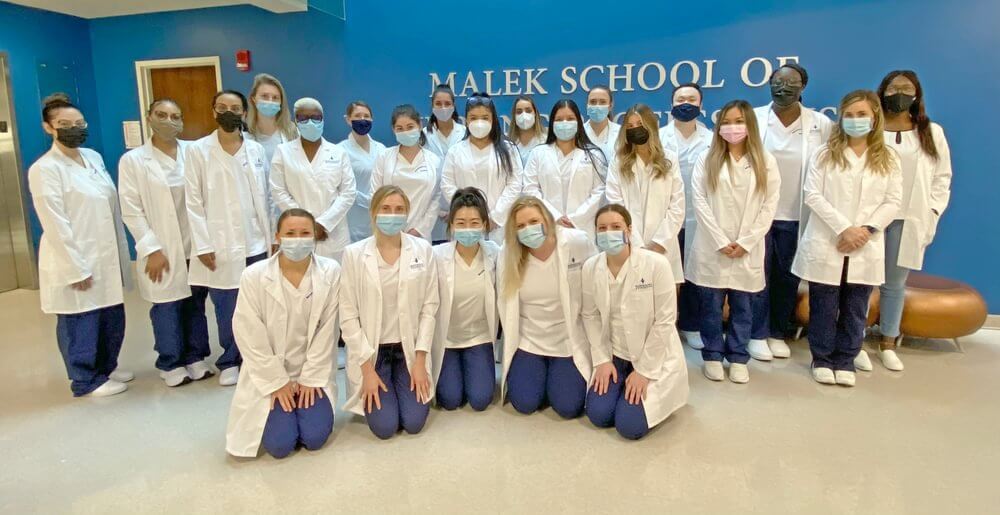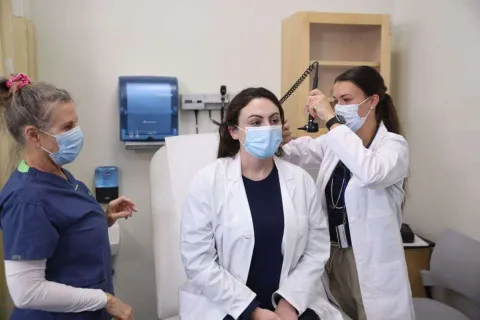12 Clinical Nursing Skills You Can Learn in an ABSN

Originally published on June 28, 2022 and refreshed April 28, 2023.
The world is constantly evolving, which means that your career path should too. Many people find themselves leaving their original field of study to pursue something completely new. As our population ages, the demand for health care and nursing is growing, and nursing trends indicate this will continue for the foreseeable future. The U.S. Bureau of Labor Statistics (BLS) projects a 6% job growth rate for registered nurses between 2021 and 2031.
Nursing school is an excellent choice for those looking to impact their community and enjoy job satisfaction, flexibility and fulfillment. Nurses at all practice levels qualify for a variety of hospital and non-hospital jobs. Nursing student skills can be applied to clinics, long-term care facilities, home health and schools. With growing experience and ongoing learning opportunities, nurses can advance to other settings or different leadership roles.
If you are passionate about making an impact and are up for the challenges of nursing, Marymount University can provide the clinical nursing skills you need to succeed.
Request My Free Marymount Accelerated BSN Program Guide
12 Essential Clinical Nursing Skills
Nursing can be described as an art and a science. To be considered competent, nurses must be knowledgeable in specific sciences. For example, nurses need to understand the signs and symptoms of certain diseases and their disease process. Nurses also convey compassion and advocacy. It is largely due to these clinical nursing skills and their compassionate nature that according to a 2021 Gallup poll, nursing continues to be the most trusted profession.

Six Soft Nursing Skills for Success
Soft skills for nurses, especially those who are considering nursing as a second career, include the following:
1. Adaptability
Nursing students need to be adaptable to change because the landscape of health care is constantly evolving at a fast pace.
2. Communication
Health care professionals rely on both spoken and written communication in many aspects of their jobs. Communication among colleagues, family members and patients occurs daily and often. Effective communication includes actively listening, having meaningful engagement and developing a good rapport with others.
3. Dependability
As with any job or career, workers need to demonstrate responsible behaviors. Nurses have obligations to coworkers, the organization and their patients.
4. Time management
Nursing students will learn to manage time effectively and practice nursing prioritization. Nursing students may experience various staffing ratios, work settings and patient caseloads. Staying organized is crucial.
5. Problem solving
Another essential nursing skill is problem-solving. Complex situations may require creative thinking to implement a solution. Time and effort are needed to ensure quality outcomes in challenging cases.
6. Stress management
Nursing’s fast-paced environment and its focus on others can make it easy for nurses to forget self-care. This can lead to unchecked stress and poor performance. To combat this, nurses can develop various strategies to mitigate the impact of stress, from regular exercise to quality time with others.

Six Clinical Nursing Skills for Success
In addition to soft skills, nurses also need to possess clinical nursing skills that are learned through education and clinical practice. Nursing students learn to master these technical skills so they can perform their job duties effectively. These competencies can also evolve into key nurse practitioner skills for those who are considering advancing their careers.
1. The nursing process
The nursing process is a series of five key clinical nursing skills at the core of providing quality, holistic patient care:
- Assessment involves critical thinking skills and data collection. This process is an accumulation of both objective and subjective information. It involves active listening and attention to detail when interacting with patients.
- Nursing diagnosis requires employing clinical judgment to assist with planning and implementing patient care that correlates with health conditions. For example, a newly diagnosed diabetic patient may have a knowledge deficit on the disease process.
- Planning for positive outcomes and establishing individualized patient goals allows the care team to take appropriate action to assist with care management.
- Implementation of the care plan requires the involvement of both the patient and the care team.
- Evaluation of whether the plan of care is effective and the desired goals are met is vital in determining whether interventions need to be changed, continued or discontinued.
2. Education and counseling on health promotion
An essential nursing skill is patient education. For example, patients with chronic diseases, such as diabetes or heart failure, require self-management skills to improve or maintain physical and psychological welfare. It is crucial to observe and learn how nurses collaborate with other health care providers to motivate patients to thrive.
3. Medication and treatments
Nurses learn to provide a safe, effective application of core nursing skills that include universal precautions (such as handwashing), medication administration and skilled nursing tasks, such as:
- Obtaining vital signs
- Catheterization
- Nasogastric tube insertion
- Wound care
- Phlebotomy
4. Care coordination
Nurses are skilled in utilizing information, communicating with others and supporting their patients. Care coordination is a key strategy to improve the health care system’s effectiveness, safety and efficiency. Care coordination includes anticipating future needs, assisting with follow-up appointments and ongoing care and referring patients to the appropriate care team members.
5. Clinical documentation
An essential nursing skill that is required is effective documentation, allowing providers to communicate confidential information to support continuity of care. Federal and state laws require accurate documentation that also reduces fraud, waste and abuse.
6. Cultural Competency
As the country becomes more diverse, it is increasingly critical for nurses to develop a fundamental understanding of the beliefs, traditions and social norms associated with different cultures. Increased cultural awareness can allow nurses to develop care strategies that respect a patient’s full perspective. This allows nurses to deploy a more holistic form of care that can improve care quality and patient satisfaction.
Start Your New Career in Less Than Two Years
Second career nursing students often have degrees in fields that are not related to health care. Your professional experience will likely have transferable attributes that you can apply toward learning essential nursing skills quickly. Previous professional characteristics that are valuable for skilled nursing students include time management, organization, communication skills and patience. If you have a degree in another field but want to move forward in a rigorous bridge program, an accelerated BSN program can aid in applying your previous experience as a fast track to nursing opportunities.
Learn Essential Nursing Skills in an Online Environment
Marymount University’s accelerated online courses keep nursing students immersed and engaged with varied remote learning modules. The course content includes the foundations of nursing science and evidence-based practice. Nursing students also study community health and research.
The online courses include remote lectures, case study-based scenarios and independent and group projects. In addition to an advisor, students have access to their teachers and classmates through email, online discussion boards and video conferencing. The flexibility of online courses allows students with other obligations to study and concentrate on learning essential nursing skills when they can be most focused and productive.
Campus Residency with Simulation Labs
Marymount University’s residency program enriches nursing student skills by having students come together for brief, intensive training. Some students learn best with hands-on practice and can receive constructive feedback and lock in the information that helps build confidence. Aside from valuable networking and camaraderie, students can share helpful tips, strategies and best practices.
Coordinated Clinical Rotations
Nursing students have the opportunity to complete a clinical rotation at an approved site. Students will work with a clinical placement team coordinator who can identify and secure a compatible clinical site, as well as a preceptor who can provide useful resources and valuable learning experiences.
Curriculum Snapshot
Marymount’s online ABSN program can help you master the above listed soft and clinical nursing skills, and many more that you need to be successful in a second career as a nurse. The first step is to complete the required form and schedule an appointment with the admissions advisor. Next, you can begin the application process. The courses listed below are a snapshot of the curriculum.
NU 230 – Introduction to Professional Nursing and Scholarship
This course serves as an introduction to the professionalism and professional values of nursing. A historical perspective is used to provide background for subsequent study of contemporary nursing practice and research.
NU 302 – Health Assessment
Prepares the student to perform a comprehensive health assessment of the adult client. Communication, documentation and ethical, spiritual and cultural considerations, as well as risks related to environmental, genetic and lifestyle factors are included. Course includes a laboratory component.
NU 334 – Mental Health Promotion and Illness Management
Focuses on mental health promotion and the care of clients with acute and chronic mental illness. Primary, secondary and tertiary prevention are addressed. The components of the health care system, research, education and society are addressed in relation to mental health and mental illness. The nursing process is applied as students assess, diagnose, plan, intervene and evaluate the care of clients experiencing mental illness. Knowledge of the nurse-patient relationship is expanded as students provide client care. Course includes lecture and clinical components.
NU 403 – Research and Evidence-Based Practice
An introduction to the process of systematic investigation necessary for the continued development of the body of knowledge that forms the basis of nursing practice. The purpose of this course is to provide learners with the opportunity to systematically examine the research process, the characteristics of practice-based research leading to the development of evidence-based nursing practice and methodologies appropriate to the investigation of researchable nursing-practice problems. This course places emphasis on guiding learners through the research process, facilitating the critical reading of nursing and related research, developing skills in identifying researchable programs encountered through nursing and stimulating intelligent application of research findings to nursing practice.
Choosing Marymount University
As the health care industry continues to grow, a skilled workforce is in demand. The nursing profession appeals to individuals who want a rewarding career with greater job satisfaction and flexibility. In making the decision to embark on this nursing journey, selecting a well-rounded ABSN program can be the key to success.
Nursing school requires commitment and focus; however, in an accelerated BSN program, a short amount of time will go a long way. Marymount University offers education in critical nursing skills from a top nursing faculty.
Do you want to hear from other students? Read testimonies from actual students sharing their experiences at Marymount University.
Marymount allows you to fast-track your path to becoming an RN with our ABSN. Contact an enrollment advisor to get started today.
